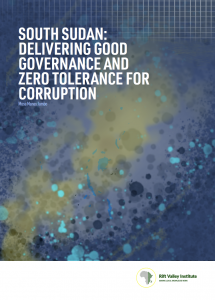EXECUTIVE SUMMARY
Putting good governance into effect in the nascent state of South Sudan has proven to be a nightmare, largely due to the presence of recalcitrant public institutions where public affairs and resources are unethically executed, undermining other institutional efforts to fight corruption. This paper examines the forces hindering the fight against corruption in South Sudan despite the presence of the various institutions of governance concerned with the struggle against it. Focus Group Discussions were used for data collection as part of an interpretivist research design. (Interpretivism interprets events based on the norms of the society in which they happen). The paper’s findings indicate that corruption is most commonly manifest in South Sudan as embezzlement, tribalism and bribery, and that it is set against the background of a weak law enforcement system and economic catastrophe. A lack of human resources’ capacity and insufficient legal support for the South Sudan Anti-Corruption Commission (SSACC) are cited as factors inhibiting its ability to function independently. The paper recommends that stakeholders demonstrate political will in enforcing and exercising laws aimed at reducing public corruption in South Sudan, that the commission’s staff capacity be expanded, and that a special court be set up to prosecute corruption cases. The legal and financial backing of South Sudan’s institutions of governance are required for the anti-corruption commission to fulfill its ethical functions.
Acknowledgements
This paper has been published as a result of Musa’s training in the Rift Valley Institute’s (RVI) Research Communities of Practice (RCoP) project. The paper therefore reflects the views of the author and not those or the position of the Rift Valley Institute. The RCoP is one of the RVI’s flagship projects that supports the professional development of early career scholars in east and central Africa through training, mentorship and dissemination of research outputs. Building on RVI’s long-term experience and presence in the region, the RCoP is a value-driven project that is built around a community of practitioners and academics with a common interest in the professional development of early career researchers. With funding from the Carnegie Corporation in New York, USA, and in partnership with the Open Society University Network-Hub for Connected Learning Initiatives, the RVI trained 27 early career scholars from Somalia, Somaliland, Ethiopia, the Democratic Republic of Congo (DRC), South Sudan and Kakuma refugee camp in Kenya in the first and second phases of the RCoP project between August 2022 and January 2024.
This report was edited by Catherine Rosemary Bond.
The Author
Musa Manas Jambo is a Lecturer and Head of Department of Political Science, University of Juba. He earned Bachelor of Science in Political Science and Master of Arts in International Relations from University of Juba.His areas of research include Peace, Security, and Good Governance in South Sudan.



